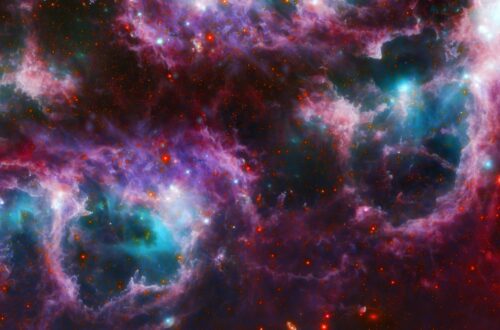 |
| … |
What do we mean by “nothing”? To define nothing one has to be able to conceive of nothing. Some say that it is impossible to conceive of nothing since nothing entails somehow the non-existence of time and space. We might be able to conceive of a particle-free space, but spacelessness and timelessness seem illusive. Of course, this does not touch on abstract objects, if one believes in such things. Others suggest that the findings of logic conclude that necessarily, something exists. Logic cannot, on that reading, conclude that nothing is possible.
One suggestion is to say that time and space are matter dependent, that time and space are relations of material things (or concrete things). Once one conceives of a particle-free zone time and space cannot exist in that zone.
Others might propose that while nothing is conceptually impossible since one cannot ascribe properties to such a “thing,” it is, rather, a negation of everything. The incomprehensibility of nothing does not disturb its possibility since it is merely the absence of all that exists even logic. Such a proposal follows an ancient tradition, via negativa (negative way), which is often used in forming concepts of God.
The most in vogue view is that there has always been something rather than nothing, that our universe is just one of many multiverses that collapse periodically and then re-boot.
The Christian contribution to the debate is the doctrine of creatio ex nihilo, the idea that God created the world out of nothing. Creation ex nihilo depends on three theses: 1) All that is created is not God and 2) All that is created was not made from any pre-existing thing 3) All that is created had a beginning. In sum, God, prior to his creative act, was confronted with no building materials and nowhere to put them.
The doctrine of ex nihilo helps us to understand our conceptions of nothing. First, the doctrine does not entail that we begin with the possibility of nothing, but with God. That God creates out of nothing means only that God uses no pre-existing “material” to make creation. Rather than starting with conceptual possibility, the theist can refuse to budge on starting with God.
The doctrine of ex nihilo also states that all creation is not God, that God does not use any of his own substance to make creation. Neo-platonists considered “the one” to be the primary substance from which all things are made. On this account God oozes his ousia. Creation is a kind of emanation from divine being. This is a very different view of God than the Bible describes. Creation is not identical with nor part of God. Creation is not made up of God’s substance.
It might be suggested that if “nothing” is conceptually incomprehensible but nonetheless possible then God is conceptually incomprehensible. This is because creation has a beginning and if anything outside of creation is incomprehensible then God, who is outside and prior to creation, is incomprehensible. This should pose no problem since the doctrine of creation entails that God is incomprehensible. Our knowledge of God, for those who hold this view, is analogical and available through the self-revelation of God.
Why is there something rather than nothing? is the question posed by a prohibitively expensive new book. Though I can’t afford the book it turns out that Kenny Pearce has determined to summarize each chapter on his fantastically lo-fi blog.
